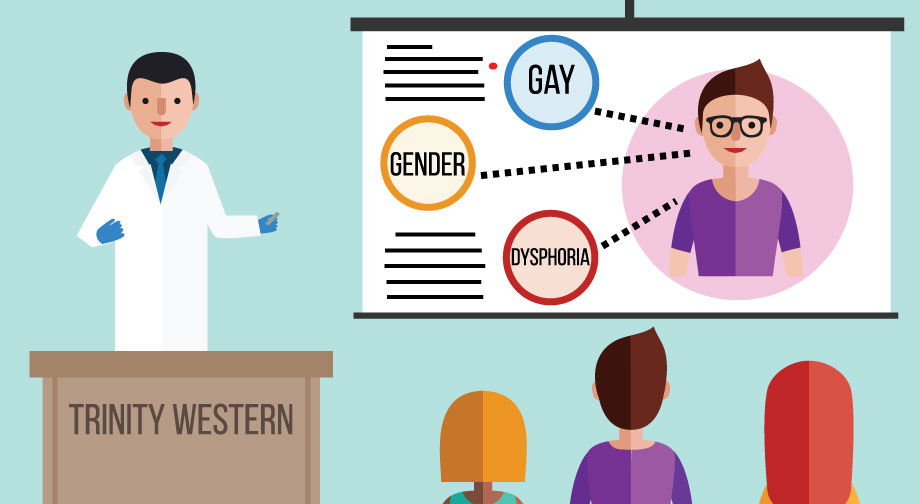
Students don’t need their sexual identity diagnosed.
Trinity Western University, a Christian university in B.C., stirred up more controversy recently when they invited Dr. Mark Yarhouse to speak at their campuses. The professor’s work is based on the belief that sexual identity can be changed.
Guy Saffold, special assistant to the president, defended Yarhouse’s visit to concerned students with the claim that, “students will learn to interact with challenging views and to have the intellectual strength to challenge back when something concerns them.”
Essentially, that boils down to a pedagogical strategy of presenting students with what not to think, and then hoping they know the difference.
Yarhouse’s invitation isn’t surprising, given the school’s covenant with students forbidding sex outside of heterosexual marriage, which recently lost them their Law Society of Upper Canada accreditation.
However, in light of that court battle, it’s strange Trinity Western would host a speaker addressing the student body on the topic of homosexuality, when, at least from the school’s perspective, none of their students are gay.
Granted, the school is a Christian institution, and it’s understandable that they would choose to invite speakers who supported their religious prerogative.
But there’s something extremely prejudicial about presenting moral or religious views in the guise of science or medicine.
Yarhouse isn’t a minister. He’s a professor of psychology. He started the Institute for the Study of Sexual Identity, which clinically analyses sexual identity and offers therapy to clients, “so that their behavior and sexual identity line up with their beliefs and values.”
He’s published many papers with titles such as “Ex Gays? An Extended Longitudinal Study of Attempted Religiously Mediated Change in Sexual Orientation”.
And Yarhouse’s talk will be on “Understanding Sexual Identity and Gender Dysphoria”. Gender dysphoria is a medical disorder that occurs in someone who doesn’t identify with their biological sex.
To be clear: homosexuality, bisexuality, being transgender or any other version of sexual or gendered identity isn’t a mental disorder. It doesn’t require diagnosis and treatment.
But, in his invitation to address their student body, there’s an implicit acknowledgment that what he has to say is important enough to go through the expense and the time of having him there.
Coming to grips with your sexuality can a bewildering experience that may require support. But, clearly, Trinity Western is incapable of providing unprejudiced guidance to its students.
There are many issues of mental health that students can be susceptible to throughout their university years and beyond — depression, anxiety, ADHD, to name a few.
Homosexuality isn’t one of them.
Tags
gender dysphoria, gender identity, homosexuality, student sexuality, Trinity Western
All final editorial decisions are made by the Editor(s)-in-Chief and/or the Managing Editor. Authors should not be contacted, targeted, or harassed under any circumstances. If you have any grievances with this article, please direct your comments to journal_editors@ams.queensu.ca.
